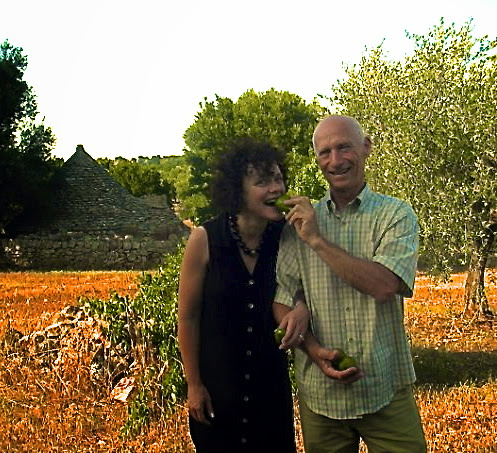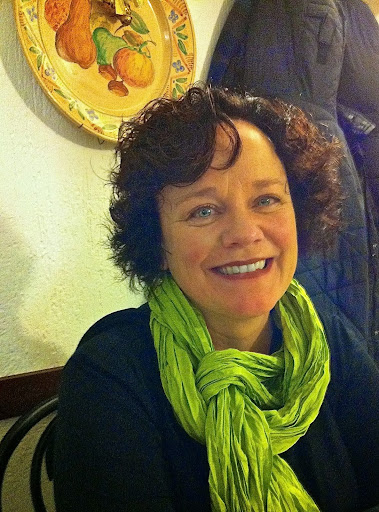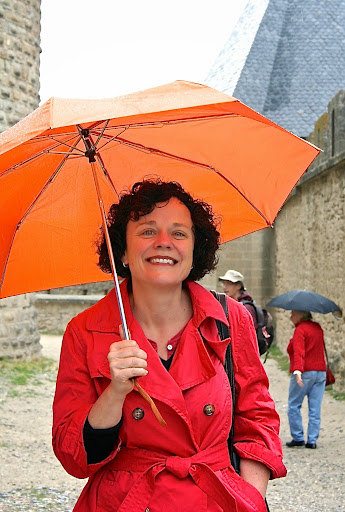#StudyAbroadBecause Global is the New Local
Catherine Faris is from California, where she spent most of her professional life as a senior administrator at the University of California, Santa Cruz. She is married to Brian Faris, a designer, general contractor, and avid cyclist. They have three adult children who live and work in California (two in management positions with international companies).
In 2012, Catherine and Brian quit their jobs, packed their stuff, and left the U.S. to create a new life in southern Italy. With help from family and friends, they export their own organic extra-virgin olive oil along with other handmade, genuine products made in Puglia. They also host their olive oil clients and friends for week long food and wine-focused tours of Puglia, creating intimate experiences far away from the tourist experiences found in most packaged travel offerings. Catherine and Brian launched their company, Pascarosa, in 2013 and are building fans of authentic, superior quality organic extra virgin olive oil and authentic travel experiences in Puglia at www.pascarosa.com every day. Catherine also blogs about her experiences in Italy at www.nuovastoria.wordpress.com.

What motivated your decision to go abroad? How/why did you choose where to go?
My mother, a high school French teacher, was a huge proponent of the study abroad experience, so I grew up with the idea that study abroad could be a part of my future. But in a moment of classic teenage rebellion, I wanted nothing to do with France and opted instead for Italy. (I know, pretty tame as far as adolescent rebellion goes, but still.) Most of my friends who were considering study abroad seemed to be heading for France, which cemented my decision to do something different. This seems to be a thread that has stitched the various elements of my life together.
So at the time, choosing Italy was not particularly studied or borne out of a deep connection to its history, culture, landscape, or anything else. Yet choosing Italy would prove to be the driving force behind so many fundamental choices I have made since then.
What was your experience like? What is your favorite memory? What were some challenges you observed?
I was a student at the University of Denver (DU), an independent school with students from all over the world. When I started looking at study abroad for my junior year, I found that DU’s study abroad program required students to be housed together in a palazzo in Florence, which was not at all the experience I wanted. My mother advised living with native speakers, spending as little time as possible with American classmates, which made perfect sense to me, so I transferred to the California State University (CSU) system in order to participate in their study abroad program in Florence. I also liked that the program lasted for an academic year, another strong suggestion from my mother if my objective was to learn Italian.
The CSU program housed its students in a pensione for the first weeks. After that, students were expected to find their own lodging for the year with the help of the program’s administrative staff. Most of the CSU students tended to band together to find shared apartments, the antithesis of the experience I sought. I went instead to the University of Florence’s mensa, the Italian equivalent of a dining hall, to peruse the lodging postings on the bulletin board there. Through a notice posted only that afternoon, I found two Italian post-doc researchers who were looking for a third roommate. We conducted the apartment negotiations in French since neither student spoke English. I moved in shortly thereafter and began my deep dive immersion into the acquisition of another language.
Not surprisingly, I had studied French in high school. Surprisingly, I was completely untroubled by my lack of Italian language preparation, which says quite a lot about the obliviousness of youth. I really didn’t know a single word of Italian. Not one. Yet I moved into a house with two highly intellectual women who entertained their equally intellectual friends at dinner most nights discussing the politics of the day. And because we were in Italy, the discussion took place simultaneously. Everyone talked. At the same time. Every night. This was easily the most difficult experience of my year in Florence. As badly as I wanted to jump in and prove that Americans were actually well versed in political theory, current events, and social theory, I was utterly incapable of speech. And it actually got worse once I had completed several months of intensive Italian class. I would formulate a carefully constructed sentence to insert at just the right moment only to find the conversational thread had shifted to an entirely different topic, leaving me without possibility of entry into the fray. Most nights I went to bed with a pounding headache and a deep sense of inadequacy, an experience my mother had foreshadowed as a character builder. I hated it.
I remember the best moment with complete recall. After about seven or eight months, I was talking to my then-boyfriend, a Florentine with deep roots in the city. He spoke both English and Italian. The moment I remember was the time when I couldn’t remember if I had shared a complex idea from one of my classes with him in English or Italian. In that moment, I realized that I could express myself equally effectively in both languages. The force of the realization stopped me cold in the street; I wanted to shout to anyone who would listen that I was bilingual.
What skills did you develop from your experience? Do you feel changed from your experience abroad?
Of course I consider Italian language acquisition to be one of the most meaningful achievements of that year, but not perhaps in the way you might think. Don’t get me wrong; it’s wonderful to be able to speak authoritatively in another language. It is the process of learning another culture through its language that is the enduring skill that emerged as a result of studying abroad. Now I know how much we miss when we can’t communicate with people in their own language that expresses their hopes, history, values, and lifestyle. And because of this realization, I see the world and its people very differently, hopefully with a surplus of compassion and respect.
I also learned that discomfort is an absolute requirement for growth. I loathed being unable to express myself, mostly because I realized that I had previously gotten a lot out of being seen as an articulate, intelligent person. The profound discomfort I felt at dinner every night propelled me to learn Italian, and learn it really, really well. Trust me when I tell you that this is a realization that transcends language. It speaks to strong self worth and confidence, which are qualities that are especially indispensable for women.

Has your experience helped you get to where you are today?
The year I spent in Italy has fueled a passion that I only glimpsed before studying abroad, shaping choices I have made for the next 30 years. I went on to graduate school in Italian, worked for an Italian film producer, opened an Italian restaurant, and now export my own organic extra virgin olive oil from Italy to the U.S. While my children were young, I became a development professional at two University of California campuses, retiring early from my last position as associate vice president of external relations. Italy and my Italian experience may seem to have little to do with my university career, but I am convinced that the communication skills and resulting confidence from that time made it possible for me to advance quickly, leading staff in difficult situations and finding humor in adversity. After all, patience and ingenuity are critical life skills in a county like Italy!
When our children were 8, 6, and 3, my husband and I decided to take a year off and live in Italy, enrolling our children in Italian public school for the kind of full immersion language acquisition experience I remembered from my year in Florence. There were some tearful moments, but that year strengthened our family identity in ways I can’t begin to communicate here. Our children not only survived, but thrived as the only English speakers among the other children, their families, and the schools’ teachers. All three are now confident and unafraid of new situations, going on to complete their own year abroad experiences in college. Two out of three now work for international companies; the third has traveled extensively throughout South America, Europe, and Indonesia. All see the world as a relatively small place with infinite variety, imminently accessible and well worth knowing.
What advice would you share with other students who are thinking of going abroad?
I strongly suggest that students live with native speakers in the countries in which they decide to pursue study abroad. And I’ll even go so far as to suggest that they live with people who really don’t speak English, not even a little. I would urge them to embrace the awkwardness and discomfort that comes from being in the minority, without adequate linguistic and cultural knowledge at first. It helps to have studied the language before arriving, but it isn’t fatal if they don’t.
I think it’s also important that students commit to a full year of study abroad. One semester isn’t enough to work through the painful process of culture shock, which is real and can be devastating. They should know that others have come before them and survived, so culture shock is survivable—a necessary part of the experience that will serve them well in their post-study abroad lives.
They should choose a program that isn’t an “elite” one. In Florence, Stanford University and the program with which my university was affiliated tried to isolate their students from the real life experience that study abroad should be. Any program that houses American students together, feeds them, and generally runs interference between the students and the country’s culture defeats the purpose of studying abroad. And the state school programs tend to be less expensive anyway, which is a benefit.
Students should try to budget well enough in advance so that they aren’t constantly worried about money. There are enough other adjustment issues to manage without the grinding anxiety that results when finances are just too tight. But hanging out with students from the country rather than students in the study abroad program should help. In Italy, most students don’t have a lot of extra spending money and are pretty conservative about how they spend it. Unlike the American students in Florence, Italian students didn’t seem to crowd the bars and clubs at night.
How has international education impacted or influenced your cultural identity?
This is an interesting question that invites reflection. Now that we live in Italy full time, I find that I have finally reached a kind of balance in terms of my cultural identity. I am profoundly American: enthusiastic, open, flexible, and sometimes overly optimistic. Instead of suppressing these qualities as I might have done in my Florence student days, I realize that they represent elements of my culture that are part of my DNA. At the same time, I don’t take anything at face value, preferring instead to dig beyond the surface for meaning that only comes when all aspects of cultural identity are explored. So I am fascinated by food, language (and its regional variations), art, music, architecture, and literature, not only for themselves but as important clues in deciphering new cultures and the people who embody them.

#studyabroadbecause global is the new local
#studyabroadbecause cultural competence is no longer optional
This is part of a series on international education, as part of our commitment to #GenerationStudyAbroad and our commitment to the White House Summit on Study Abroad and Global Citizenship. You'll find many more inspiring stories here on Wandering Educators! Do you have one to share?
All photos courtesy and copyright Catherine Faris




















